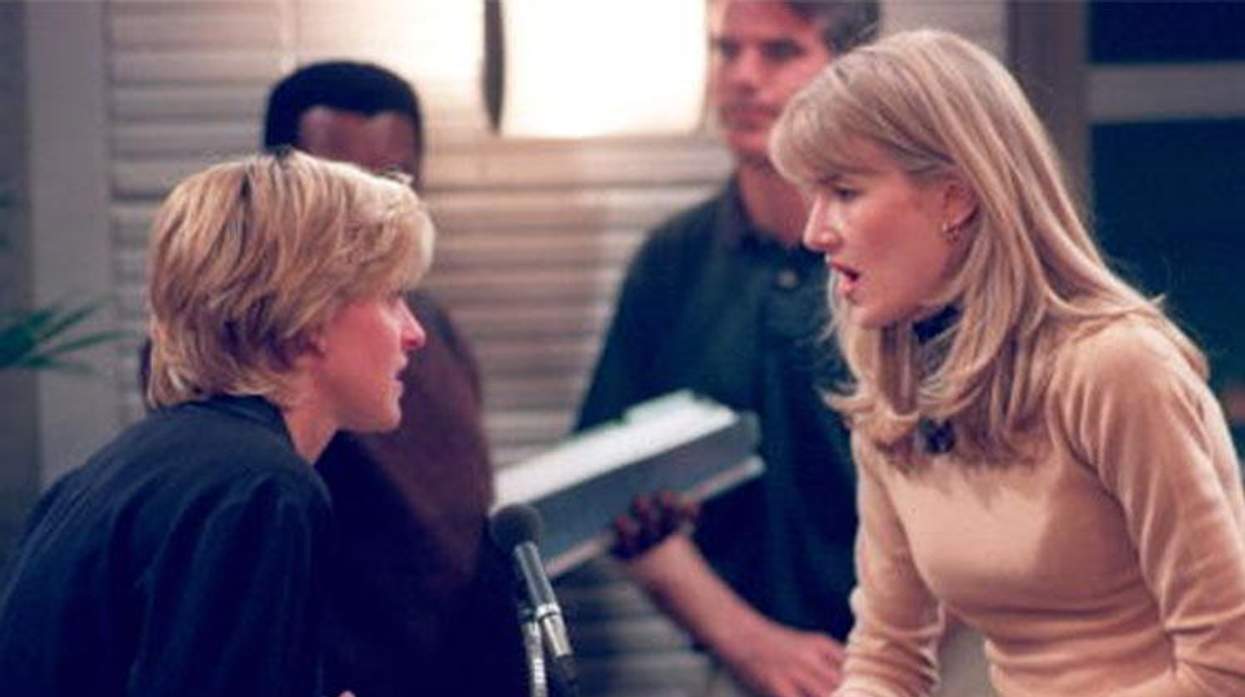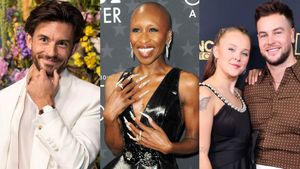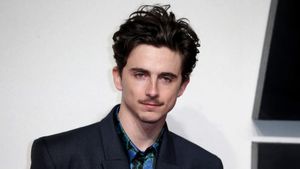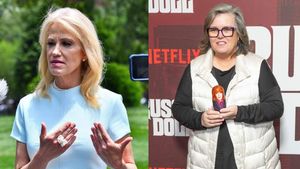The summer of my sexual awakening I had a tryst with a woman I met at Girl Scout camp. By day we were counselors doing the Hokey Pokey and by night we were meeting clandestinely under a crisp starry sky behind any number of pine trees or in my parked beige Tercel, doing, well, not the Hokey Pokey. While I'd engaged in a couple of sapphic encounters prior to meeting her, at just 18, I eschewed, even recoiled from labeling whatever it was we were. So when she suggested on a big night out from camp that we visit a gay-owned bookstore and cafe in Hartford, Conn., nearly an hour away, where we could hold hands in public, I said flatly that I didn't want to be seen there. "I'm not queer," I said, as visions of crystal-rubbing, patchouli-soaked women in Birkenstocks serving me limp slabs of tofu while reciting poems about the floral essence of genitalia swirled in my head.
At some point, she managed to drag me to that place I feared -- the Reader's Feast Cafe, where I downed nachos with homemade vegetarian chili and gazed askance at the women dining there with whom there was an unspoken kinship I wasn't ready to acknowledge. Within months, the Feast, as it was lovingly called, became my hangout. A few years later, I could be found there several times a week, eating, perusing the books on the shelves that were as far-flung as Patience and Sarah and Susie Sexpert's Lesbian Sex World, and fingering the pages of The Advocate as if it were hidden treasure before inevitably buying it. My visits to the Feast were so frequent that the owner eventually offered me a job waiting tables, and so I worked there for a period of time in the early 1990s, when k.d. lang came out in 1992 and Melissa Etheridge in 1993-- their stories filling the pages of The Advocate on the magazine rack steps away from where I slung breakfast burritos and mimosas at Sunday brunch.
In the mid-'90s I moved away for a few years, regrettably upending my life to escape to Phoenix with a woman I barely knew. Upon returning to Connecticut I took another job at the Feast to help me get back on my feet. And that's where I worked when Ellen DeGeneres, who scattered jokes and clues for the audience for nearly a season of her show, came out in life and on her sitcom Ellen on April 30, 1997. The episode was event television the likes of which I had never experienced -- akin to the Oscars for me, but personal and with lasting effects. I treated the day of her coming-out like it was my birthday, celebrating it in ways that were meaningful to me. I went for a drive and rolled down the windows of the green Toyota Tacoma truck I owned for a year that I named Idgie in honor of the character in Fried Green Tomatoes, blasting the Indigo Girls' Shaming of the Sun, which was released the day before DeGeneres came out. It was a uniquely memorable lesbian moment in time that I both sincerely and ironically cherish. For months leading up to the big coming-out episode, whether I was waiting on a table of regulars or of people I'd never met, or hustling in the kitchen to make a cappuccino beside a coworker, the conversation at the Feast eventually, always turned to DeGeneres and how much it meant that she would be the first gay lead character on television. Before Facebook, Twitter and Instagram, we gathered at the Feast to share ideas. It was our tangible brick-and-mortar safe haven.
It's now 20 years since DeGeneres came out and I live in Los Angeles, incidentally the place where her sitcom was set. I'm 3,000 miles from where the Feast stood in Connecticut, and I work as The Advocate's feminism editor, a position I arrived at after running SheWired, the company's site for queer women, for eight years. I'm so fully entrenched in LGBT pop culture and media in my job, I live just a few miles from the gay mecca of West Hollywood, I'm a member of the Gay and Lesbian Critics Association, and I'm an active member of the very queer AIDS/Lifecycle community. Yet on a recent solitary weekend, I craved a space where I could hunker down with a book and my computer, and sip on a macchiato while surrounded by queer women, and in this entire megalopolis of Los Angeles, there wasn't a single place I could think of to go. As DeGeneres's coming-out turns 20 and marriage equality is the law of the land, I realized that day that I've never felt more isolated from the lesbian culture that helped shape me.
In honor of DeGeneres's coming-out anniversary, I bought "The Puppy Episode" on Amazon Prime and watched it in my office, at turns chortling at her gentle humor that still holds up and brimming with tears over the profundity of what her coming-out would mean for LGBT visibility. As DeGeneres prepares to close out on the 14th season of her wildly successful talk show, it's easy to forget that when celebrities, including Oprah Winfrey, Laura Dern, k.d. lang, Melissa Etheridge, Jenny Shimizu, Demi Moore, and Gina Gershon, appeared on her coming-out episode, it was an act of solidarity, and it was subversive.
In the "The Puppy Episode," DeGeneres's character Ellen Morgan meets and falls for a woman who inspires her to not only come out of the closet but to utter the words she never could. "I'm gay," Morgan eventually, emotionally says into a microphone at an airline boarding gate full of people, including the object of her affection, Susan (Dern). The episode continues with Morgan coming out to her friends and working through the magnitude of the event with her therapist (Winfrey). While Ellen Morgan and Susan, sadly, don't end up together, DeGeneres's alter ego finds love and acceptance in the people who've always been there for her. Her friends, so willing to accommodate her new life, conspire to take her to a lesbian coffee shop where she can be among people like her.
All these years later, I had forgotten about the scene in the coffee shop called Little Frida's on the show, where a pink-triangle, lavender T-shirt clad lang, sporting a mullet, sings an anthem about sisterhood. Back in the late '80s, when I was content to hide in cars or behind trees exploring aspects of my sexuality I'd barely even read about, I'd have tossed back my Flock-of-Seagulls-esque wisp of white hair that covered one eye and sneered at that stereotype of the "earthy-crunchy" lesbian in a cafe. But here in Los Angeles, in 2017, where the last queer bar for women in the city shuttered its doors in 2013, and vegan restaurants (once often code for incredibly fringe and queer) now exist in chains and on every other street corner in some parts of town, I mourn venues like that cheesy lesbian cafe in "The Puppy Episode."
DeGeneres paid a price for coming out, something that's also hard to remember now that she's one of the most visible lesbians on the planet. Her show was canceled the following season and she barely worked -- save for a failed attempt at a sitcom reboot in 2001-- before landing her talk show in 2003. The Feast, incidentally, closed about two years after the coming-out episode. I began writing for Metroline, Hartford's regional LGBT publication, and I eventually applied to and was accepted at Mount Holyoke College as a non-traditional aged student. One of the Seven Sisters colleges for women, Mount Holyoke, is located 20 minutes from Northampton, Mass., which is home to Smith College and was dubbed "Lesbianville USA" by The National Enquirer in the early '90s (with good reason). So while the Feast, just blocks from my apartment in Hartford, morphed into a Mexican restaurant circa 1999, to feel anonymous but never alone, I never had to search further than the library at Mount Holyoke where girlfriends draped themselves over each other while studying Jane Eyre, or to any number of cafes in Northampton where conversations about the queer relationships on Buffy the Vampire Slayer or Queer as Folk could be overheard.
Now I'm coming up on half a century, having lived 31 years of those years as an out lesbian fighting for recognition and equality during the AIDS epidemic, and throughout the long fight for marriage equality. And while I stand toe-to-toe with all LGBT people as we brace ourselves for battling Donald Trump and defending any number of rights and human dignities at risk under his administration, I find myself once literally and metaphorically grasping for that kind of female space that shaped my coming-out -- my Reader's Feast, my Little Frida's.





































































Charlie Kirk DID say stoning gay people was the 'perfect law' — and these other heinous quotes